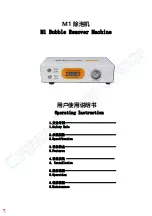
Operating Instructions 1-8DEC 230V
Description and Function
3.4 Rebound Chamber (Plenum)
Once the abrasive has impacted the work surface, the shot is directed into the rebound
plenum. This curved portion of the machine absorbs a large percentage of the force
exerted by the high velocity abrasive and helps dissipate the heat generated by the
blast process. Once the abrasive and contaminant mixture reaches the top of the
rebound plenum, it enters the separator.
3.5 Deflector Plate / Hopper
Refer to Figure Number 4
Once the contaminated abrasive leaves the rebound plenum, it enters the separator
and immediately encounters the deflector plate. The deflector plate slows the abrasive
down even more before it enters a tray at the bottom of the deflector plate. The
contaminated abrasive hits the abrasive already at the bottom of the plate and
effectively absorbs any residual force left in the moving mixture. The contaminated
abrasive then falls through a curtain of high velocity clean air, which physically
separates the heavy abrasive and the lighter contaminants. The air wash pulls the
contaminants through the separator towards the exhaust and eventually to the dust
collector. The clean abrasive falls to the bottom of the separator, then into a hopper
where it can be reused.
3.6 Abrasive Seals
Refer to Figure Number 5
Magnetic abrasive seals are present on all sides of the rectangular opening at the
bottom of the blast housing. These magnets are charged with a load of abrasive and
draw any loose abrasive onto their surface, thus providing a “seal” to help contain the
high impact abrasive from the surface being cleaned. The front and back have a brush
attached. This brush drags across the work surface and allows clean air to be drawn
inside the machine for cooling and to assist in the reclamation process.
12
Summary of Contents for 1-8DECMKI
Page 18: ...17...
Page 19: ...18...
Page 20: ...19...
Page 29: ...Operating Instructions 1 8DEC 230V Edging Mode Section 6 6 1 Edging Mode 28...
Page 31: ...30...
Page 35: ...Operating Instructions 1 8DEC 230V Wear Parts Section 8 8 1 Wear Parts 8 2 Maintenance Log 34...
Page 50: ...Operating Instructions 1 8DEC 230V Specifications Section 12 12 1 Specifications 49...














































